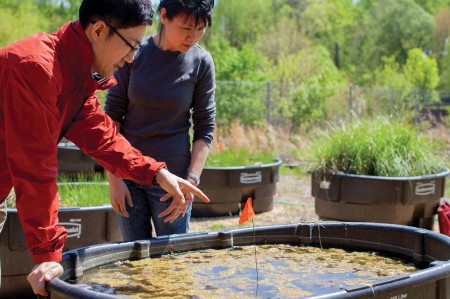
Students in the Environmental Science and Policy class use the wetlands mesocosm compound to engage high schoolers. (MAURICE C. JONES/BROADSIDE)
Mason biology students will be presenting results of wetlands research to area high school students on May 10 in the West Campus Wetlands Mesocosm Compound.
According to Professor Dr. Changwoo Ahn, wetlands ecologist and associate professor with the Department of Environmental Science and Policy (ESP), the presentation is a part of the Ecological Sustainability class.
Ecological Sustainability is a research-intensive course that teaches students how to integrate what they have learned and conduct scientific experiments around the theme of building ecologically sustainable environments to mitigate the effects of wetlands loss and climate change, using the West Campus Wetlands Mesocosm Compound. The compound of medium-sized microcosms is designed specifically for testing and observations of wetland growth and degradation.
“Under the theme of ecological sustainability, I’m teaching how to do science, or how to conduct a scientific experiment,” Ahn said. “So a little bit of math and a little bit of science is [in the course], and actually there is a lack of courses where we teach directly to students or where we provide them the opportunity to combine or integrate the things they have learned from courses like chemistry or math or physics into just one course.”
Throughout the semester, students are trained how to read and interpret scientific journals, form and test hypotheses and analyze and interpret data from their experiments and fieldwork.
The students are then evaluated on their interpretive skills. This helps prepare students to be able to interpret and explain results and data from their own experiments to others who are not scientists, which they will put into practice when high school students visit West Campus Wetlands Mesocosm Compound.
“One big part is science communication, because a lot of problems we’re dealing with, especially environmental problems, [are] coming from the lack of communication between scientists and policymakers,” Ahn said. “As part of that, the students will present their research and outcomes, not only to their peers, [but] to high school students.”
According to Ahn, students in the course must prepare posters for visiting students who come to observe Ecological Sustainability students’ work in the compound. The visiting students will be encouraged to ask questions, and presenters will be evaluated on how well they present and explain their conclusions without using complicated scientific language.
“So, that practice plays an important role in science education and I wanted to actually explore that in this class,” Ahn said. “[It] completes the complement very well of this course as a research and scholarship course.”
Although the main goal of the activity is to foster dialogue and understanding between scientists and non-scientists, another goal is the development of this program as a potential teaching method, according to Ahn.
He will present his conclusions about the class on September 20, 2013 at the Center for Teaching & Faculty Excellence’s Innovations in Teaching and Learning Conference.
“I think it’s going to provide a good experience to [the high school students] and a really good experience for undergraduates in this class as well,” Ahn said. “So, at the moment I’m documenting everything, all the details carefully, so that the documentation can be developed into some kind of story and some kind of protocol that can be presented.”






Comments